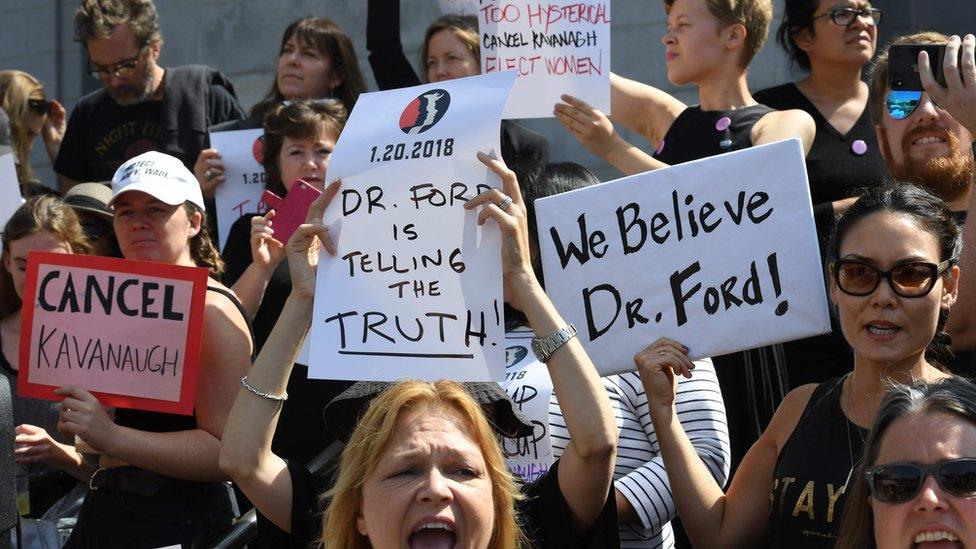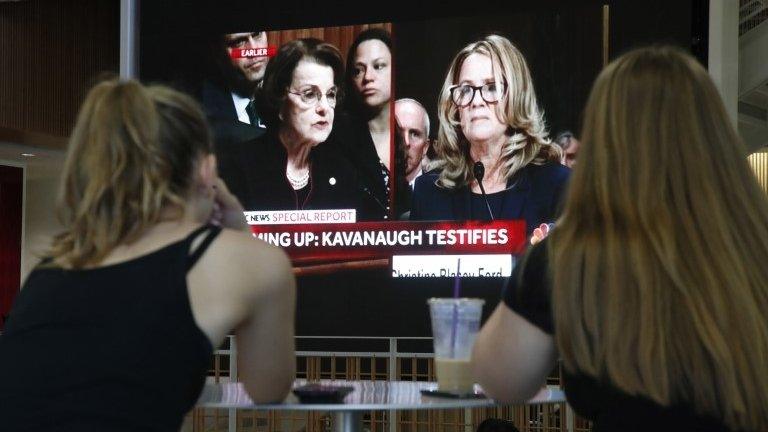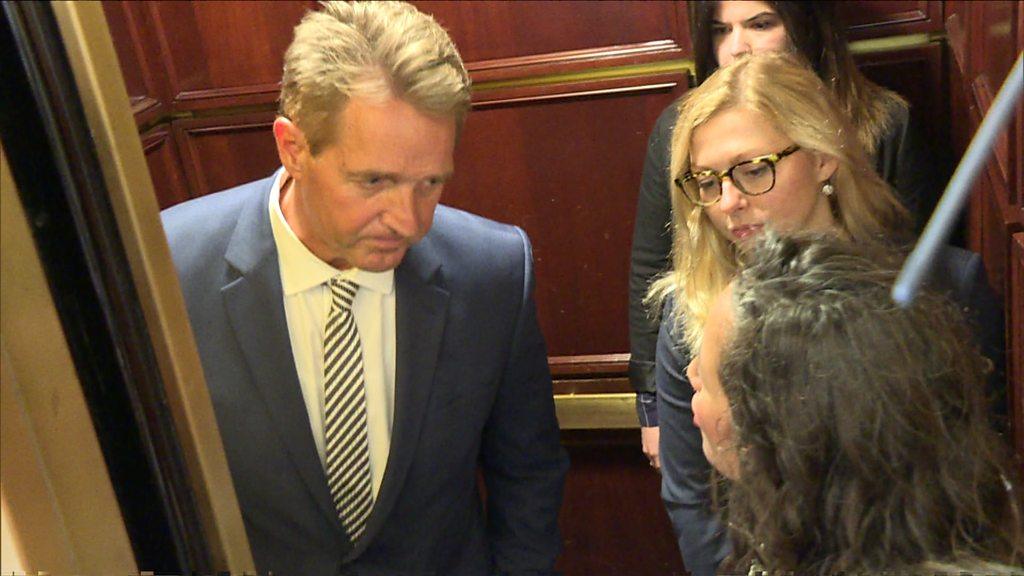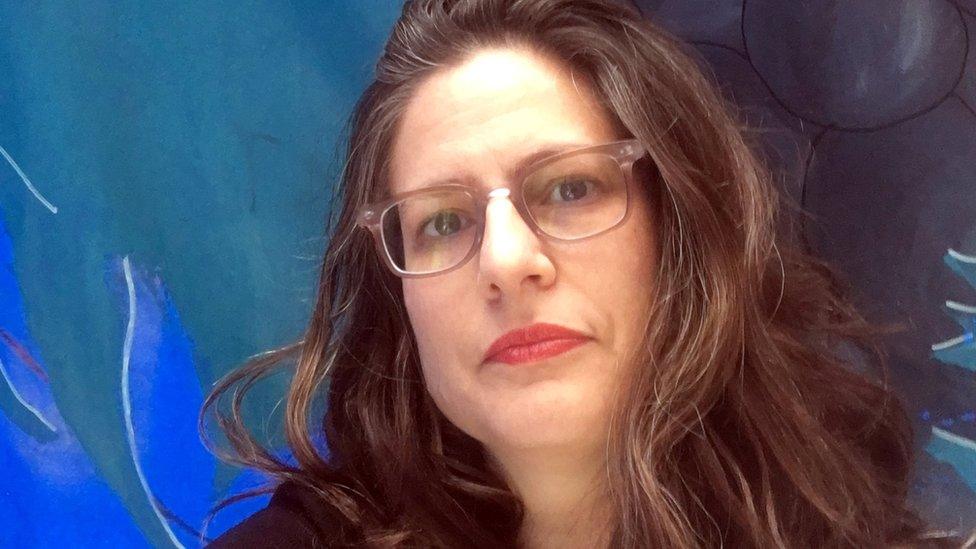Kavanaugh hearings: Who were the women confronting Jeff Flake?
- Published
Republican Senator Jeff Flake is challenged by a sexual assault survivor.
It was a moment that spoke to millions across America.
Two young women passionately confronted a senator in a lift.
He was en route to vote yes and help clear the path for a man accused of sexual assault to assume one of the country's highest offices.
"Look at me when I'm talking to you - what you're telling me is my assault doesn't matter," one woman shouted. "Thank you," a seemingly-embarrassed Senator Jeff Flake finally mumbled.
Earlier the senator had said he planned to support Supreme Court nominee Brett Kavanaugh despite testimony on Thursday from his accuser Christine Blasey Ford, a professor of psychology in California.
After a few minutes it was over. A moment in time encapsulating women's outrage about sexual violence.

Demonstrators hold anti-Kavanaugh hold posters outside City Hall in Los Angeles on 28 September
Video of it spread like wildfire on social media as thousands applauded their bravery. But no-one guessed what its impact might be.
Hours later Senator Flake changed his mind as he faced the Senate Judiciary Committee.
He made a final yes vote on the House floor conditional on an FBI investigation into the assault allegations made by Prof Ford.
And, finally, the women who seemed to help reverse the senator's decision made themselves known.
"I feel relieved that @JeffFlake seems to have heard my and @AnaMariaArchil2's voices in the Senate elevator today," tweeted Maria Gallagher on Friday afternoon.
Allow X content?
This article contains content provided by X. We ask for your permission before anything is loaded, as they may be using cookies and other technologies. You may want to read X’s cookie policy, external and privacy policy, external before accepting. To view this content choose ‘accept and continue’.
The 23-year-old from Westchester, New York had never told anyone about her assault before, according to the Daily Beast, external. Her mum called her after seeing her protest on television.
"He wouldn't meet my eyes. It made me very angry. He kept saying thank you and I'm sorry and wasn't taking into account what his actions would be doing to millions of people and what this means for everyone," she told the website.
Ms Archila, a 39-year-old mother of two, had spent a week in Washington protesting Mr Kavanaugh's nomination when she saw Mr Flake in a Capitol Hill hallway.
The executive director of non-profit Centre for Popular Democracy told the New York Times that she was assaulted when she was five, external. "I wanted him to feel my rage," she said.
It was one of the first times either she or Ms Gallagher had shared their accounts. Ms Archila's father only found out that his daughter had been assaulted when he watched the encounter today.
"When the #MeToo movement broke out, I thought about saying it - but I wrote things and deleted it and eventually decided I can't say, 'Me too,'. But when Dr Blasey did it, I forced myself to think about it again," she told the newspaper.
She wasn't the only one. Women around the world watched their social media feeds filling up with striking, personal accounts of traumatic assaults.
Some shared privately between friends, others posted publicly:
"I watched my attacker act his part out in court more than 25 years ago. I sat thinking of what I could have done to have not gotten raped. I thought of the days I'd gone without eating or drinking anything. My road to recovery has been steep, filled with obstacles and heartbreak."
"I was the victim of sexual abuse as a child. Memories of it will always haunt me though I feel like a survivor."
"I am a sexual assault survivor, and today I am exhausted. I don't feel there is any justice to be had."
"I am a sexual assault survivor (who reported and was treated by cops like I asked for it). I am the mother of a 7-year-old daughter. I am heartbroken and terrified."
"I am a survivor of sexual assault. Just like most of my friends. It's so common. I am so lost. Women are so strong and we will get through this hurt."
Woven through these women's accounts is fear that no-one believes them. And anxiety that advancement of Mr Kavanaugh's confirmation to the Supreme Court less than 24 hours after Ms Ford's testimony would send a crystal-clear signal to the nation that politics is more important than women's rights.
Maria Gallagher and Ana Maria Archila might have changed that.
By Georgina Rannard, UGC & Social News
- Published28 September 2018

- Published28 September 2018

- Published28 September 2018
